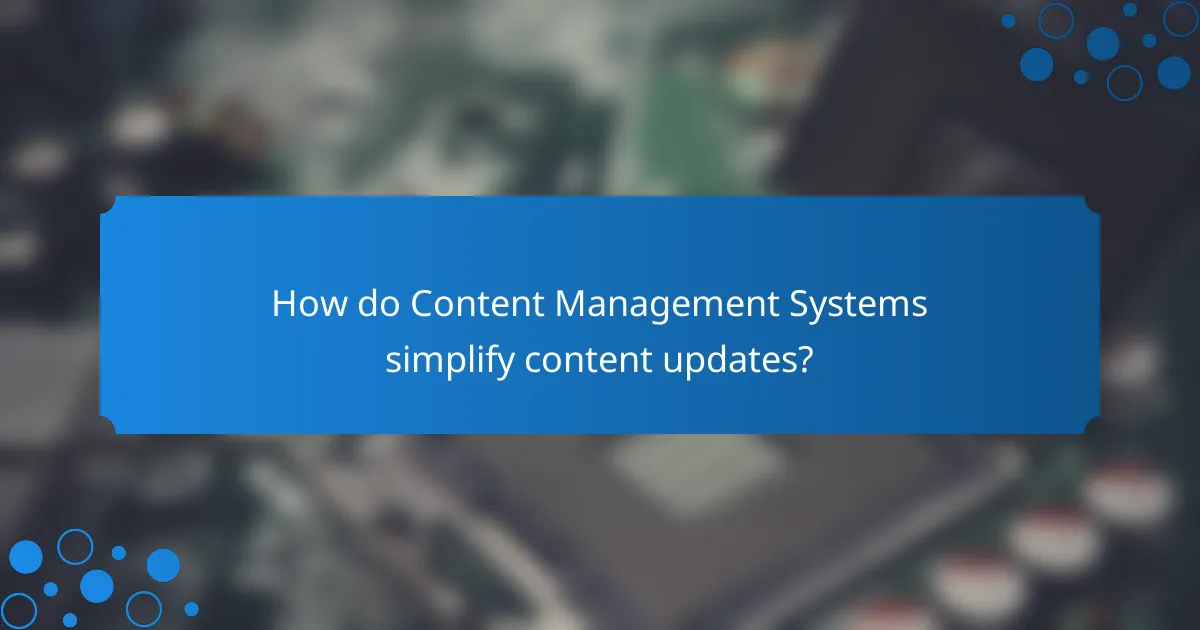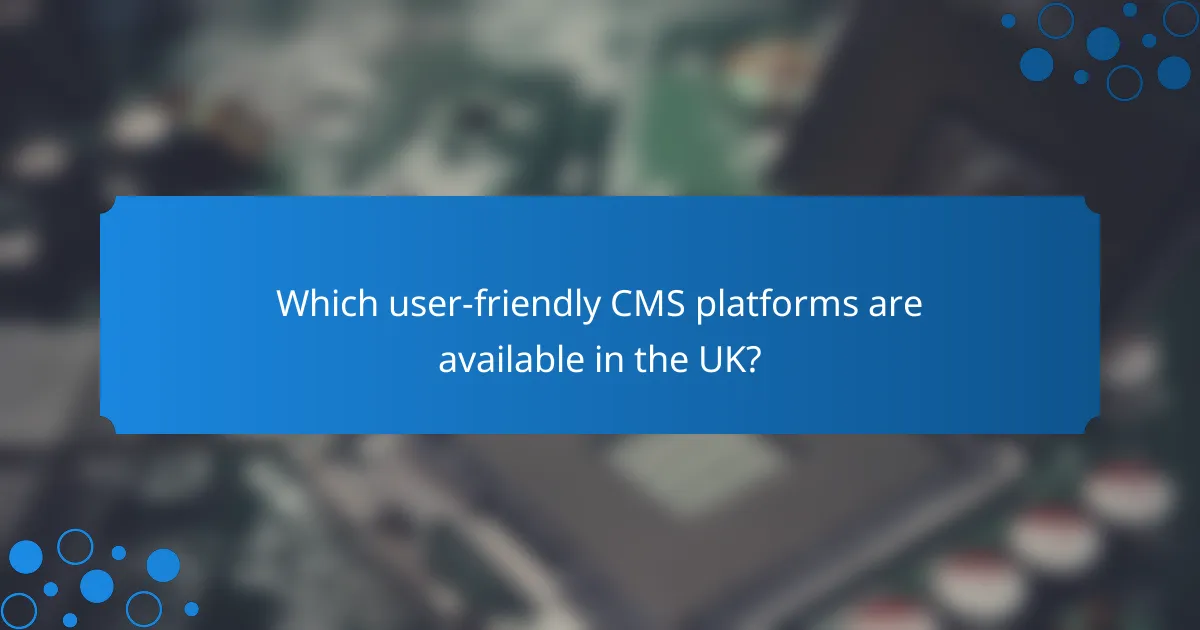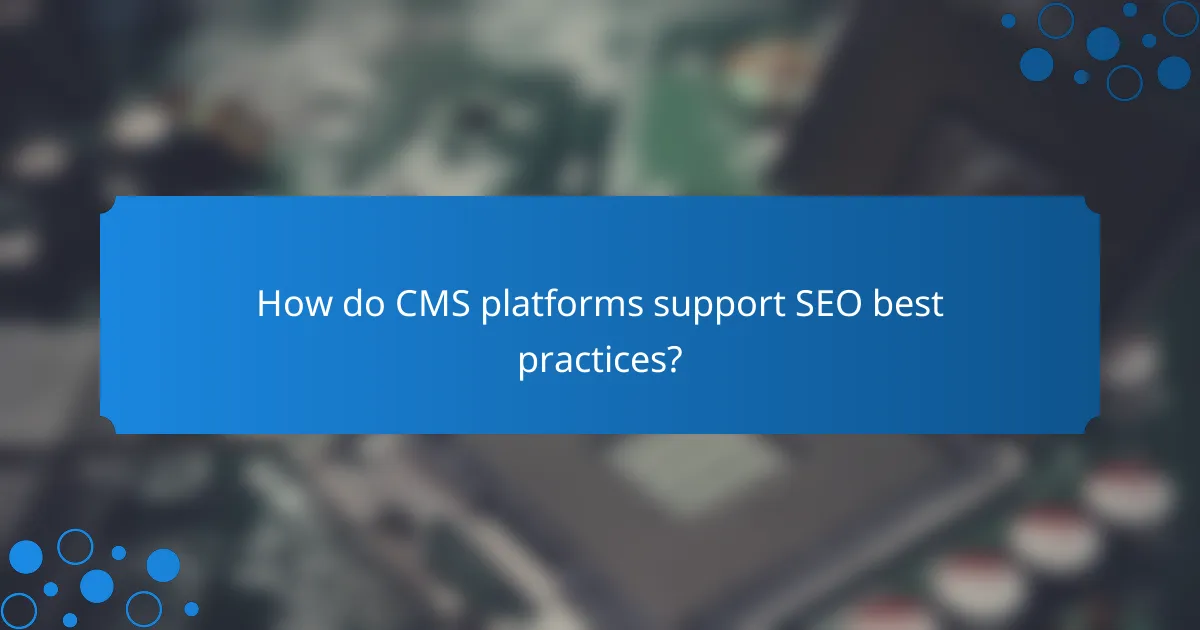Content Management Systems (CMS) simplify website content updates, allowing users with minimal technical skills to keep their sites current and engaging. By incorporating SEO-friendly features, these platforms not only facilitate optimization but also help improve search engine visibility. With various user-friendly options available, such as WordPress and Wix, businesses can easily find a CMS that meets their specific needs.

How do Content Management Systems simplify content updates?
Content Management Systems (CMS) streamline the process of updating website content, making it accessible for users without technical expertise. They provide tools that allow for quick modifications, ensuring that businesses can keep their information current and relevant.
Real-time editing features
Real-time editing allows users to make changes to their content and see the results instantly. This feature is particularly useful for teams that need to collaborate, as multiple users can work on the same document simultaneously without overwriting each other’s changes. It enhances productivity by reducing the time spent on revisions.
Drag-and-drop interface
A drag-and-drop interface simplifies the process of arranging content on a webpage. Users can easily move images, text boxes, and other elements without needing to write code. This intuitive design makes it accessible for anyone, regardless of their technical background, to create visually appealing layouts.
Version control capabilities
Version control in a CMS allows users to track changes made to content over time. This feature enables easy restoration of previous versions if needed, providing a safety net against unwanted edits. It is essential for maintaining the integrity of content, especially in collaborative environments.
Scheduled publishing options
Scheduled publishing lets users set specific dates and times for content to go live. This is beneficial for planning marketing campaigns or ensuring timely updates without manual intervention. Users can prepare content in advance, allowing for a consistent flow of information without the need for real-time management.

What are the SEO benefits of using a CMS?
Using a Content Management System (CMS) can significantly enhance your website’s SEO performance. A CMS typically includes features that streamline optimization processes, making it easier for users to implement best practices and improve search engine rankings.
Built-in SEO tools
Many CMS platforms come equipped with built-in SEO tools that simplify the optimization process. These tools often allow users to edit meta tags, alt text for images, and header tags without needing extensive technical knowledge. For example, popular CMSs like WordPress offer plugins that provide real-time SEO suggestions as you create content.
When selecting a CMS, look for those that offer comprehensive SEO features, as this can save you time and improve your site’s visibility. Always ensure that the tools are user-friendly and compatible with your existing content strategy.
Optimized URL structures
A well-structured URL is crucial for both user experience and SEO. Most CMS platforms allow you to create clean, descriptive URLs that include relevant keywords, which can improve search engine indexing. For instance, instead of a generic URL like www.example.com/page?id=123, a CMS can help you create www.example.com/seo-benefits-cms.
When setting up your URLs, aim for simplicity and clarity. Avoid using complex parameters and keep URLs as short as possible while still being descriptive.
Automatic sitemap generation
Automatic sitemap generation is a feature offered by many CMSs that helps search engines crawl your site more efficiently. A sitemap outlines the structure of your website, making it easier for search engines to find and index your pages. This is particularly beneficial for larger sites with numerous pages.
Ensure that your CMS automatically updates the sitemap whenever you add or remove content. This keeps search engines informed of your latest updates, which can positively impact your search rankings.
Mobile responsiveness
Mobile responsiveness is essential for SEO, as search engines prioritize mobile-friendly sites in their rankings. Most modern CMS platforms provide responsive design templates that automatically adjust to different screen sizes, ensuring a seamless user experience across devices.
When choosing a CMS, verify that it supports responsive design and test your site on various devices to ensure optimal performance. A mobile-friendly site not only improves your SEO but also enhances user engagement and retention.

Which user-friendly CMS platforms are available in the UK?
Several user-friendly content management systems (CMS) are available in the UK, catering to different needs and skill levels. Popular options include WordPress, Wix, Squarespace, and Joomla, each offering unique features that simplify content updates and enhance SEO.
WordPress
WordPress is one of the most widely used CMS platforms globally, known for its flexibility and extensive plugin ecosystem. Users can easily update content, optimize for SEO, and customize their sites with thousands of themes and plugins.
For UK users, WordPress offers various hosting options, from budget-friendly shared hosting to more robust managed services. It’s essential to choose a reliable hosting provider to ensure site speed and security.
Wix
Wix is a drag-and-drop website builder that allows users to create visually appealing sites without coding knowledge. Its user-friendly interface makes it ideal for beginners who want to launch a site quickly.
Wix includes built-in SEO tools, such as customizable URLs and mobile optimization, which can help improve search engine rankings. However, users should be aware of the limitations in switching templates after a site is live.
Squarespace
Squarespace is known for its stunning design templates and all-in-one platform that combines hosting, domain registration, and CMS capabilities. It’s particularly favored by creatives and small businesses looking for a polished online presence.
With built-in SEO features and analytics, Squarespace helps users track performance and optimize content. However, its pricing may be higher than some competitors, so consider your budget before committing.
Joomla
Joomla is a powerful CMS that offers more complexity than WordPress but provides greater flexibility for developers. It’s suitable for users who need advanced features and are comfortable with a steeper learning curve.
Joomla supports multiple languages and is a good choice for international sites. Users should ensure they have adequate technical skills or support, as managing a Joomla site can be more demanding than other platforms.

What criteria should you consider when choosing a CMS?
When selecting a Content Management System (CMS), prioritize ease of use, integration capabilities, and scalability options. These factors will significantly impact your ability to manage content effectively, enhance SEO, and accommodate future growth.
Ease of use
Ease of use is crucial for ensuring that team members can quickly adapt to the CMS without extensive training. Look for intuitive interfaces, drag-and-drop features, and clear navigation to streamline content updates.
Consider platforms that offer user-friendly dashboards and customizable templates, which can simplify the content creation process. A CMS with a low learning curve can save time and reduce frustration for users at all skill levels.
Integration capabilities
Integration capabilities determine how well your CMS can work with other tools and platforms, such as CRM systems, email marketing services, and social media. A CMS that supports various plugins and APIs can enhance functionality and improve workflow efficiency.
Evaluate the available integrations to ensure they align with your existing tools. For example, if you rely on Google Analytics for tracking, choose a CMS that easily connects with it to monitor performance metrics effectively.
Scalability options
Scalability options are essential for accommodating future growth and increased traffic. A CMS should be able to handle a growing volume of content and users without compromising performance.
Look for systems that offer flexible pricing plans, allowing you to upgrade as your needs change. Additionally, consider whether the CMS can support larger databases and more complex functionalities as your business evolves.

How do CMS platforms support SEO best practices?
Content Management Systems (CMS) enhance SEO by providing tools that streamline optimization processes. These platforms facilitate easy updates, allowing users to implement SEO best practices efficiently and effectively.
Customizable meta tags
Customizable meta tags are essential for SEO, as they help search engines understand the content of your pages. Most CMS platforms allow users to edit title tags, meta descriptions, and keywords for each page, which can significantly impact search rankings.
When creating meta tags, aim for concise and relevant descriptions that include primary keywords. Keep title tags under 60 characters and meta descriptions around 150-160 characters to ensure they display correctly in search results.
Image optimization features
Image optimization is crucial for improving page load speed and enhancing user experience, both of which are important for SEO. Many CMS platforms offer built-in tools for compressing images and adding alt text, which helps search engines index images effectively.
To optimize images, use formats like JPEG for photos and PNG for graphics. Always include descriptive alt text that incorporates relevant keywords, as this can improve visibility in image search results.
Content hierarchy management
Content hierarchy management involves organizing content using headings and subheadings, which helps search engines understand the structure of your pages. A well-structured hierarchy improves readability and can enhance SEO performance.
Utilize heading tags (H1, H2, H3) appropriately to create a logical flow of information. Ensure that your primary keyword appears in the H1 tag and use H2 and H3 tags for subtopics, which can help search engines better index your content.
